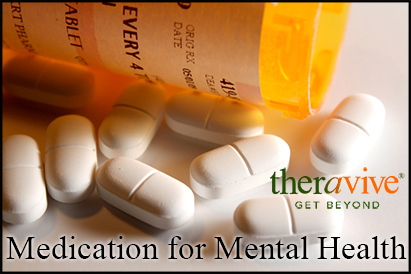 Medication is one of those hot topics that some people really don't like to talk about if they don't have to. Because of this, they find that it's really difficult to see why someone may need medication. Millions of people around the world take some sort of medication for mental illness, so if this is something that has come up with your psychiatrist or another mental health professional, it's nothing to be ashamed of. Medication can play a significant role in helping with mental illness, and that's what we're going to explore in this blog post today.
Medication is one of those hot topics that some people really don't like to talk about if they don't have to. Because of this, they find that it's really difficult to see why someone may need medication. Millions of people around the world take some sort of medication for mental illness, so if this is something that has come up with your psychiatrist or another mental health professional, it's nothing to be ashamed of. Medication can play a significant role in helping with mental illness, and that's what we're going to explore in this blog post today.
Why Do Some People Need Medication?
It is common for people who are struggling with mental health issues to need medication for some or all of their mental health treatment plan. Even though this is disconcerting for some people, medication can play a significant role in a successful mental health treatment plan. Here are some of the main reasons that some people are in need of medication as part of a mental health treatment plan.
Reasons For Medicating
Some people have chemical imbalances that require medication in order to help balance. A good number of people with mental health issues have some sort of chemical imbalance that they are dealing with on a regular basis. This chemical imbalance can't be fixed by traditional counseling or therapy, and someone may need to take medication in order to deal with the chemical imbalances. This could be because of hormones, it could be because of heredity, or it could just be how someone's body is set up. Either way, it can really help you to deal better with the imbalances if you are getting the help that you need through medication, and then you can learn healthy techniques of dealing with your symptoms if they come up at a later time.
Some people are unable to move forward with other therapy until they are able to alleviate certain symptoms, which can happen with medication. Sometimes, mental health issues are too much to bear and people cannot move forward with therapy and other treatment unless they "clear up the fog" so to speak. The fog can be really dark and frustrating for people at times, and by making sure that these parts of the mind are clear, a counselor can start behavioral therapy or whatever other type of therapy that needs to happen in order for the person in question to move forward in their lives in a healthy way. In these cases, the medication may not be a permanent thing, but in other cases, it may be.
Some people need medication in order to function in a positive way in society. For more severe mental health issues, medication may be necessary for someone to be able to function in a positive manner. Many times, especially if someone is dealing with a disorder like schizophrenia or bipolar disorder, traditional therapy by itself is not enough in order to keep the symptoms under control in an effective way. Yes, it can help them to learn how to deal with some of the symptoms, but many times, people need more of a boost in order to be able to live and thrive. Medication can play a significant role in doing that, and many times, these people live better lives if they are taking their medication as they should be. In some cases, it's hard to get people with these issues to take their medication properly, but if it can be accomplished, life is better for them and their loved ones.
There are other reasons, of course, but these three reasons are probably the most common reasons that medications end up being prescribed to people with mental health struggles. Other reasons may vary, and they may range from temporary solutions to permanent prescriptions that are needed in order for someone to live a "normal," healthy life that they deserve to live.
What Can Medication Do For People?
Medication plays a lot of roles in mental health therapy, and is usually used as part of the whole. Medication is never a cure, but instead helps with certain symptoms so that other therapy can be administered in a healthy way that helps the patient to make progress. Here are some of the main things that medications can assist with mental illness on the whole.
Medication can help people deal with their mental health struggles so that they can receive behavioral treatment. As mentioned above, some people are in need of medication so that they can receive traditional counseling or behavioral therapy that helps them to learn how to deal with the symptoms. Many medications, for example, those for anxiety issues, can help to clear out the panic and the "fog" that may occur in someone's mind, making it easier for them to receive information and learn how to deal with their symptoms if they ever come back. The best way to get mental health treatment, as we just mentioned, is to take care of medication plus getting traditional therapy or counseling as well.
 Medications can help people to reduce fearful thoughts. If you have anxiety or you are struggling with hearing voices in your head, there are a number of medications out there that can help to reduce the amount of stress and fear that you may be feeling. This is one of the types of "fog" or mental blocks that I've been talking about in this article. By reducing or eliminating those fearful thoughts and anxiety, people are able to think more logically, thus making it easier to work with their anxiety or other mental health problems that they may be dealing with in their life at this moment. Reduction of fearful thoughts also makes it easier to function normally, as well.
Medications can help people to reduce fearful thoughts. If you have anxiety or you are struggling with hearing voices in your head, there are a number of medications out there that can help to reduce the amount of stress and fear that you may be feeling. This is one of the types of "fog" or mental blocks that I've been talking about in this article. By reducing or eliminating those fearful thoughts and anxiety, people are able to think more logically, thus making it easier to work with their anxiety or other mental health problems that they may be dealing with in their life at this moment. Reduction of fearful thoughts also makes it easier to function normally, as well.
Medications can reduce depressive moods or anxious feelings. If you struggle with depression, there are a number of medications out there that help to reduce the depressive moods. Mood disorders (such as Major Depressive Disorder, or MDD) are becoming more common, and sometimes the feelings of sadness can become so overwhelming that it's hard to deal with it in a healthy way. By being prescribed the appropriate medication (which, sadly, can take a few tries at times), someone can deal with those depressive thoughts in a healthy way. It will take time for the medication to kick in (most take at least a little while to get really going), but once everything starts to fall into place, it can really help people to live a more functional, healthy lifestyle that has more positive thinking. It's the same way with anxious feelings - sometimes, anxiety comes without fearful thoughts (or at least, without clear fearful thoughts that you can identify). If you have anxious feelings, they can sometimes be incredibly overwhelming and people don't really know what to do with them. Medications can help reduce those feelings so that one is better able to process their thoughts and work through the anxious feelings in an effective manner.
Medications can help people to relax in a safe and healthy manner. Relaxing can be very hard if you are struggling with some sort of mental illness or mental health issues. Some people struggle with insomnia as a result of their mental health issues, and it can end up doing more harm than good. Because of this, a psychiatrist may recommend sleeping pills or even tranquilizers to help someone relax a lot easier. This also goes for people who have panic attacks and panic disorders. By taking medication, these people are better able to cope with their disorder and they are able to think through things in a manner that is logical and not frightening, thus reducing or eliminating the symptoms that sometimes come with these issues.
Medication is Great, but it's not for Everyone
Medications can play a lot of different roles, but not everyone actually needs medication. Many people are able to overcome their mental health struggles with therapy alone, and with medication for only a brief amount of time. It all depends on your condition, the reason behind your condition, and what your mental health professional(s) say about what is going on with your particular mental health needs. Many times, one needs to go through a series of tests and such in order to determine whether or not medication should be included as part of therapy. If you are struggling with a mental health issue, check out the resources that we have here on the site so that you find the best type of therapy for your specific needs. It may include medication, it may not, but no matter what, you will start to see progress when you start to talk to a medical professional about your mental health struggles. Contact one today and see the difference it can make in your life.
________________________________________________________________________________________________________________________________
Hazelden Foundation. (2014). Medications Play a Key Role in Treatment. Retrieved June 6, 2014, from http://www.bhevolution.org/public/medications.page
Mental Health America. (n.d.). Medication. Retrieved June 6, 2014, from http://www.mentalhealthamerica.net/medication
Mental Health Foundation. (n.d.). Medication for mental health problems. Retrieved June 7, 2014, from http://www.mentalhealth.org.uk/help-information/mental-health-a-z/M/medication/
NAMI. (2012, July). Treatment and Services. Retrieved June 6, 2014, from http://www.nami.org/Template.cfm?Section=About_Treatments_and_Supports&Template=/ContentManagement/ContentDisplay.cfm&ContentID=10510
NIMH. (2008). Mental Health Medications. Retrieved June 6, 2014, from http://www.nimh.nih.gov/health/publications/mental-health-medications/index.shtml
About the Author
 Marti Wormuth, MA
Marti Wormuth, MAMarti has a Bachelor’s Degree in Sociology and a Master’s in Communication Studies. Her favorite activities include reading, playing games, and hanging out with the students at her church. Marti volunteers with the youth ministry at her church as a teacher and mentor. Because of this, she recently started another degree, her graduate certificate in student ministries. She considers her current graduate work to be a stepping stone to becoming a youth pastor or a published author.
Professional Website:
martis-miscellany.com/